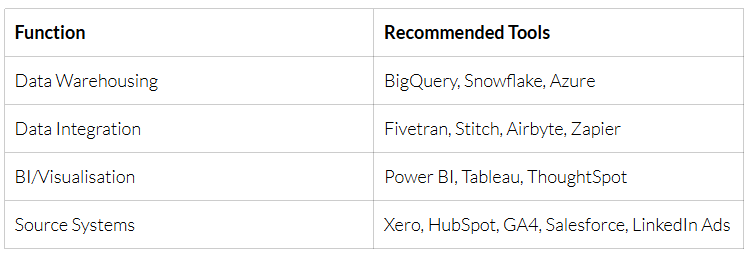Data Integration Services in Australia: Why It Matters and How to Get It Right
As more Australian businesses embrace digital tools, cloud apps, and software as a service platforms, the challenge isn’t finding data, it’s bringing it together in a way that actually helps you run and grow your business.
That’s where data integration services come in.
In this guide, we’ll unpack:
What data integration actually means (in plain English)
The problems it solves for growing businesses
Common data sources in mid-market and enterprise firms
The benefits of working with a data integration partner in Australia
Tools we recommend, and how to get started
What Is Data Integration?
Put simply, data integration is the process of connecting your systems so that data from different platforms flows into one place, clean, matched, and ready to use.
It might involve:
Connecting your finance system (e.g. Xero, MYOB, NetSuite) with your CRM (e.g. HubSpot or Salesforce)
Syncing campaign performance from LinkedIn Ads, GA4 or Meta Ads with internal sales data
Consolidating spreadsheets, SaaS platforms, or legacy databases into a central cloud data warehouse
This allows you to:
Reduce manual data handling
Spot trends faster
Make confident, data-informed decisions
Why Australian Businesses Need Better Data Integration
Many Australian companies are operating across dozens of disconnected platforms — finance, ops, sales, marketing, and service — with no single source of truth.
That creates problems like:
Wasted hours pulling reports from multiple systems
Errors from manual spreadsheet work
Conflicting versions of metrics or KPIs
Slow decision-making and reactive planning
With solid data integration in place, you can:
Automate reporting
Track key business metrics in real time
Cut down on wasted effort
Align finance, ops and leadership around the same numbers
It’s not just about tech, it’s about visibility, accuracy, and speed.
Common Data Sources We Help Integrate
At Pentify Insights, we support clients across Australia to connect and unify their most critical data sources. These often include:
Accounting & Finance: Xero, MYOB, NetSuite, QuickBooks
CRM & Sales: HubSpot, Salesforce, Pipedrive
Marketing: LinkedIn Ads, Google Ads, Meta Ads, Mailchimp
Web & Analytics: GA4, Hotjar, website form tools
Operations & Delivery: ServiceM8, SimPRO, WorkflowMax
HR & Payroll: Employment Hero, BambooHR, Deputy
Spreadsheets: Excel, Google Sheets with key operational data
We help bring these into cloud-based data platforms like BigQuery, Snowflake or Azure to create one place to work from.
Benefits of Using a Local Data Integration Partner
Working with a data integration services provider in Australia gives you advantages like:
Local systems knowledge: familiarity with common platforms used by Aussie businesses
On-call support in your timezone: no waiting overnight for updates or troubleshooting
Better alignment with regulatory requirements: especially around finance, data privacy, and compliance
Face to face or real-time collaboration: for strategy sessions, solution reviews, or stakeholder engagement
We’ve worked with clients across industries, including financial services, property, logistics, and education, helping them reduce reporting time, clean up messy data, and gain real-time business visibility.
Our Approach at Pentify Insights
We provide flexible data integration services that work the way your business does.
Our team helps you:
Map out your current systems and data flows
Clean and structure the data properly
Design and build a central cloud data warehouse
Connect your tools and apps through API or secure file transfer
Set up dashboards that actually answer your key business questions
We do all of this with a business-first lens, not just dumping raw data into a warehouse, but turning it into something useful.
And because we operate on a Data as a Service (DaaS) model, you get:
Ongoing access to a fractional data team
Flexible support that can scale up or down
Clarity on costs without needing to hire in-house
Tools and Platforms We Use
Make it stand out
Whatever it is, the way you tell your story online can make all the difference.
We help you select tools based on your needs, budget, and existing setup.
Results You Can Expect
Our clients typically see:
Up to 75% reduction in manual reporting effort
70% fewer errors from spreadsheets and manual data transfer
Time savings of 10–20 hours per week
Stronger visibility across departments and data sources
More confident decision-making based on trusted metrics
In some cases, we’ve helped clients save over $50,000 a year in software and resource costs by eliminating redundant tools and automating previously manual workflows.
What Makes Pentify Different
We’re not just an IT provider or dashboard builder. We work like an extension of your team.
We speak business, not just data
We move fast, and build what you actually need
We adapt with you, so the solution grows as your business does
Whether you’re starting from messy spreadsheets, trying to scale, or just tired of manual reporting, we can help you move toward a clearer, more connected data foundation.
How to Get Started
The first step is a simple conversation. We’ll:
Review your current tools and reporting workflows
Identify where integration can save time and reduce effort
Map out what a modern, connected data platform could look like
From there, we design and build with you, not just for you.
If you're ready to clean up your data, automate your reporting, and finally trust your numbers, let’s chat.
Contact Pentify Insights to learn more about our data integration services in Australia.

